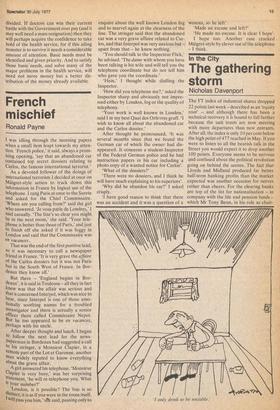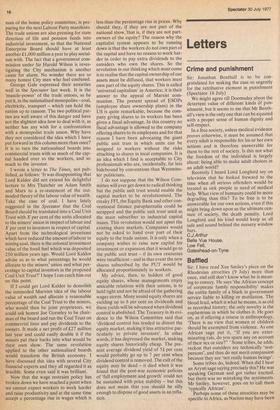In the City
The gathering storm
Nicholas Davenport
The FT index of industrial shares dropped 22 points last week described as an 'equity rout' and although there has been a technical recovery it i bound to fall further because the unit trusts are now meeting with more departures than new entrants. After all, the index is only 10 per cent below the high point of 477 reached in May. If you were to listen to all the bearish talk in the Street you would expect it to drop another 100 points. Everyone seems to be nervous and confused about the political revolution going on behind the scenes. The fact that Lloyds and Midland produced far better half-term banking profits than the market expected was another occasion for nerves rather than cheers. For the clearing banks are top of the list for nationalisation — in company with the life and pension funds — which Mr Tony Berm, in his role as chair man of the home policy committee, is preparing for the next Labour Party manifesto.
The trade unions are also pressing for state direction of life and pension funds into industrial investment, so that the National Enterprise Board should have at least another £1,000 million a year to play socialism with. The fact that a government com mission under Sir Harold Wilson is investigating the City mechanism is another cause for alarm. No wonder there are so many honest City men who feel confused.
George Gale expressed their anxieties weU in the Spectator last week. It is the 'muscle-power' of the trade unions, as he put it, in the nationalised monopolies — coal, electricity, transport — which can hold the nation up to ransom. The two political parties are well aware of this danger and have not the slightest idea how to deal with it, as neither has any wish for a confrontation with a monopolist trade union. Why have they not considered the idea which I have put forward in this column more than once? It is to turn the nationalised boards into commercial trusts with so much of the capital handed over to the workers, and so much to the investor.
I wrote a letter to The Times, not published, as follows: 'It was disappointing that Lord Kaldor did not extend his delightful lecture to Mrs Thatcher on Adam Smith and Marx to a re-statement of the outmoded theory of the labour value of wealth. Take the case of coal. I have lately suggested in the Spectator that the Coal Board should be translated into a Coal Unit Trust with X per cent of the units allocated to the miners' union in respect of labour and X per cent to investors in respect of capital. Apart from the technological inventions which have reduced the amount of labour in mining coal, there is the colossal investment value of the fossil fuel which was deposited 250 million years ago. Would Lord Kaldor advise us as to what percentage he would allocate to the miners' union and what percentage to capital investors in the proposed Coal Unit Trust?' I hope I can catch him out on this point.
If I could get Lord Kaldor to demolish the outmoded Marxian idea of the labour value of wealth and allocate a reasonable percentage of the Coal Trust to the miners, who would then be joint proprietors, we could ask honest Joe Gormley to be chairman of the board and run the Coal Trust on commercial lines and pay dividends to the owners, It made a net profit of £27 million last year and could easily double it if the miners put their backs into what would be their own show. The same revolution applied to the other nationalised boards would transform the British economy. I have discussed this idea with several City financial experts and they all regarded it as feasible. Some even said it was brilliant.
Now that the wage restraint policy has broken down we have reached a point when we cannot expect workers to work harder and raise productivity and at the same time accept a percentage rise in wages which is less.than the percentage rise in prices. Why should they, if they are not part of the national show,"'that is, if they are not partowners of the equity? The reason why the capitalist system appears to be running down is that the workers do not own part of the capital and have no reason to work harder in order to pay extra dividends to the outsiders who own the shares. So the revolution in our thinking which must come is to realise that the capital ownership of our assets must be diffused, that workers must own part of the equity shares. This is called 'universal capitalism' in America; it is their answer to the appeal of Marxist communism. The present spread of ESOPs (employee share ownership plans) in the US is quite remarkable, because the company giving shares to its workers has been given a fiscal advantage. In this country no fiscal advantage is allowed to the company offering shares to its employees and for that reason I have been advocating the giant public unit trust in which units can be assigned to workers without the risks attaching to shares in local companies. It is an idea which I find is acceptable to City professionals who are, incidentally, far less hidebound by conventions than Westminster politicians.
I do not suppose that the Wilson Committee will ever get down to radical thinking but the public unit trust would enable the capital market to be revolutionised. The creaky FFI, the Equity Bank and other conventional finance paraphernalia could be scrapped and the public unit trust used as the main subscriber to industrial capital issues. This revolution would not upset the existing share markets. Companies would not be asked to hand over part of their equity to the trade unions. It is only when a company wishes to raise new capital for investment or expansion, that it would go to the public unit trust — if its own resources were insufficient — and in that event the new shares subscribed by the PUT would be allocated proportionately to workers.
My advice, then, to holders of good equity shares, whose managements enjoy amicable relations with their unions, is to hold tight and not be afraid of the gathering wages storm. Many sound equity shares are yielding up to 8 per cent on dividends and these yields will be advanced when dividend control is abolished. The Treasury in its evidence to the Wilson Committee said that 'dividend control has tended to distort the equity market, making it less attractive particularly to private investors'. In other words, it has depressed the market, making equity shares historically cheap. The present average dividend yield of 5i per cent would probably go up to 7 per cent when dividend control is removed. The cult of the equity may be dead — it died when it was found that the post-war economic policies of 'full employment and growth' could not be sustained with price stability — but this does not mean that you should be silly enough to dispose of good assets in an' infladon .



































 Previous page
Previous page